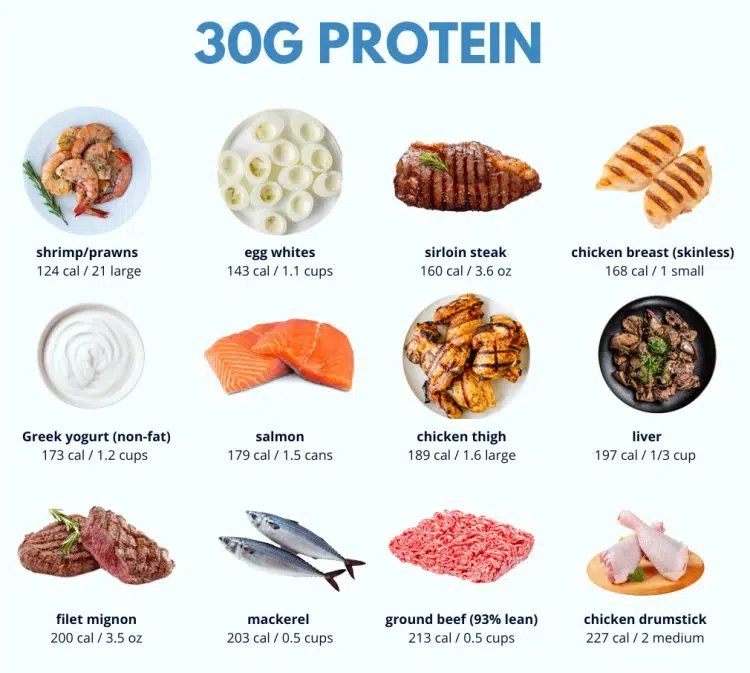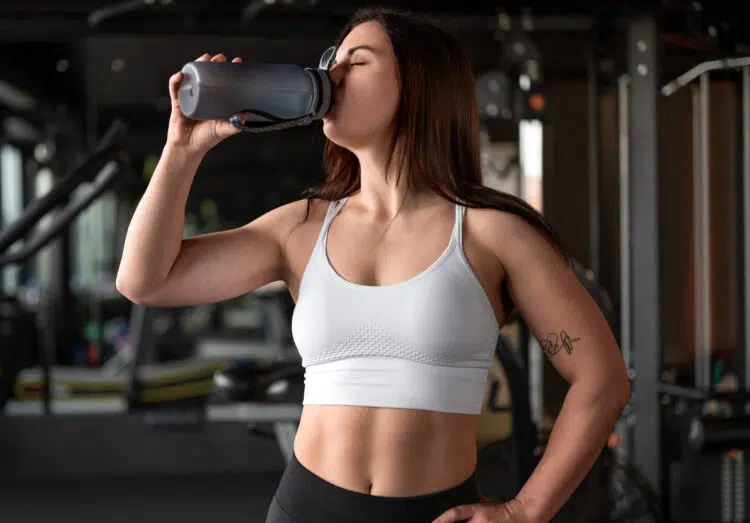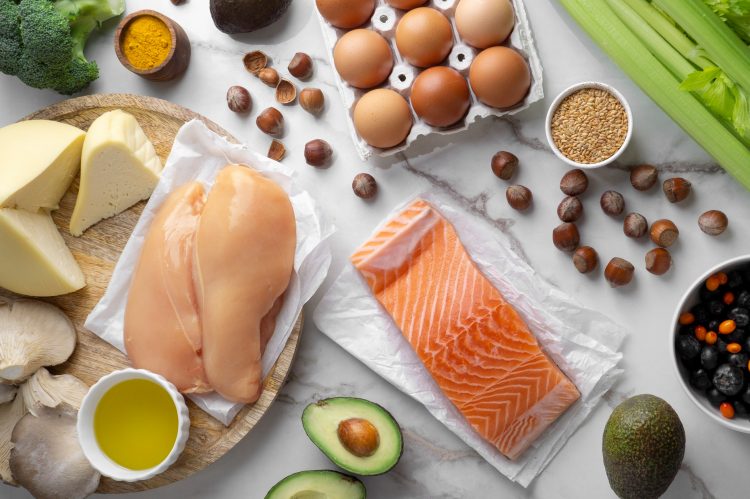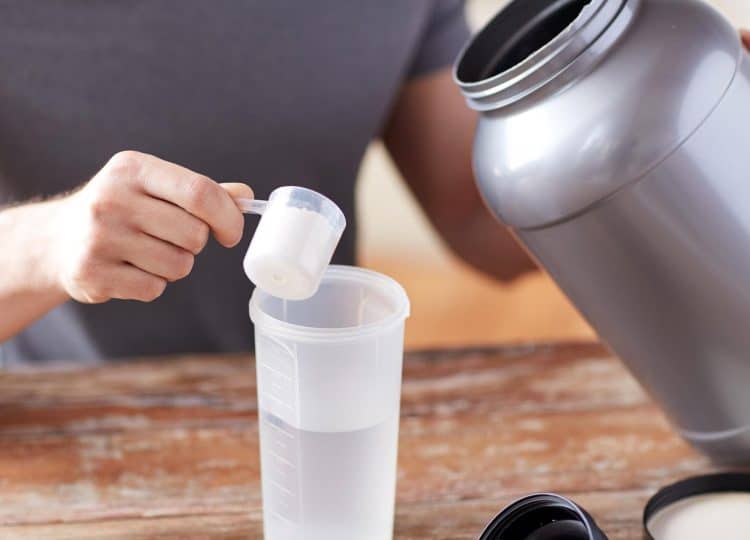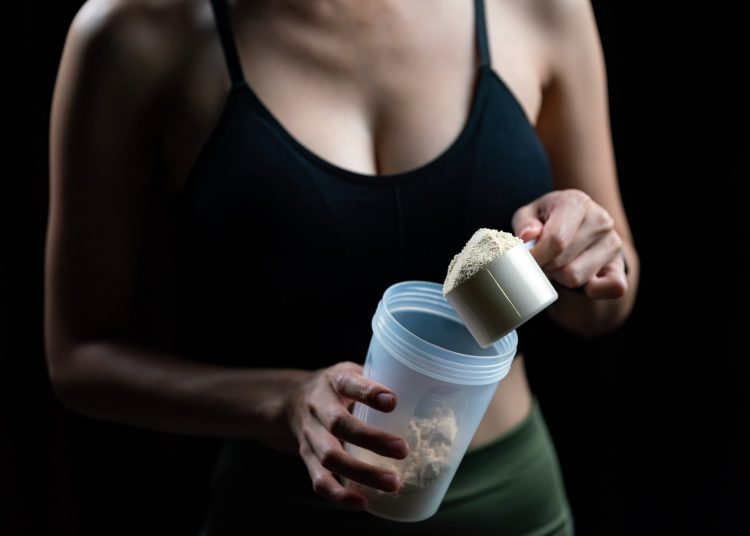The best thing that has probably come out of fitness Instagram is that a big chunk of people are now aware that protein is the most important macronutrient for building muscle tissue. However, there is still a ton of misinformation about the ideal protein intake for building muscle, losing weight, and improving overall health.
Protein is made of small units known as amino acids. When you lift weights, you break down muscle tissue. Amino acids repair these muscles and rebuild them so they are bigger and stronger through a process called muscle protein synthesis.
As someone who has been lifting weights for over 17 years, I have firsthand experienced the difference that changing your daily protein intake can make in your physique aesthetics and strength.
Furthermore, protein is a superfood as it can improve your hormone production, help you feel full and energized for longer, improve your immunity, and regulate your mood. (1)
In this article, I’ll decode the science of protein to give you all the knowledge you need to maximize your gains, irrespective of whether you’re aiming to build muscle, shed body fat, or improve your overall health and well-being.
Protein Basics For Better Results
Protein is beautiful. Besides making you look absolutely jacked, it can improve your bone, skin, and hair health and bolster pretty much every other tissue in your body.
Make no mistake, skimping on protein can be a disaster as it can impair your core body functions.
Let’s return to amino acids for a minute.
There are 20 different amino acids in total. They can be divided into two categories — essential and non-essential. Essential amino acids are called so because your body cannot produce them on its own, and you must get them through your diet.
On the other hand, your body can produce non-essential amino acids, so you don’t have to worry so much about getting them from food.
Protein Sources
There are two main types of protein sources. Here is everything you need to know about them:
Animal Sources:
These include meat, poultry, fish, eggs, and dairy products, and they generally contain all the essential amino acids that your body needs, which is why they are also called complete proteins.
Plant Sources:
Beans, lentils, tofu, nuts, and seeds are some of the best plant-based protein options. However, since these lack one or more essential amino acids, they are considered incomplete proteins.
Vegans or vegetarians can combine different plant-based protein sources to get all the essential amino acids.
Coach Tip: Invest the time in learning about different food sources to avoid nutrient deficiencies.
Finally, not all protein sources are created equal. Protein quality, that is, how easily your body can digest a protein source, can make all the difference in your results. Animal protein sources are usually more bioavailable than plant proteins. Making the right food choices can improve your gut microbiome, leading to better overall health and gains. (2)
Protein for Muscle Gain

Every time you lift weights, you are essentially creating micro-tears in your muscle fibers. Think of protein, like the cement that comes in and repairs these cracks, making your muscles bigger and stronger than before.
To build muscle, you must be in a positive nitrogen balance. This basically is a fancy way of saying that you must consume more protein than your body is breaking down. It ensures that your muscles have all the building materials they need to help you achieve your fitness objectives.
Protein Requirement For Muscle Gain
Research published in the Nutrients journal suggests that you must aim for 1.6 to 2.2 grams of protein per kilogram of body weight to build muscle and ensure optimal health. (3)
Beginners and people who are not that active can start with 1.6 grams of protein. As you gain more experience and start doing more, you should progressively bump up your protein intake.
Remember, these are just guidelines. You should consult your healthcare provider before starting a new diet or training program, especially if you are dealing with existing health issues.
Timing Your Protein Intake
Gym bros will tell you to consume your protein at a particular time during the day. For instance, the ‘anabolic window’ is a sacred subject within the bodybuilding community and involves consuming a high-protein meal within one to two hours of your workout.
However, recent studies have shown that the timing of your protein intake isn’t as important as your overall daily protein consumption. You should break down your daily protein goals into three to four meals so that your muscles have a constant supply of amino acids throughout the day. It will also keep you feeling full for longer, reducing the chances of splurging on junk food. (4)
With all said and done, experts recommend consuming a higher dose of protein in your pre-and post-workout meals to prevent muscle breakdown and kickstart recovery.
Protein for Weight Loss
Protein can be an incredibly potent weapon for folks trying to lose weight. This is how:
Keeps You Feeling Full
Protein is the most effective of the three macronutrients when it comes to keeping you feeling full and satisfied for longer. This is a big deal as it will help you fend off hunger pangs, keeping you on track with your diet.
Protein is more metabolically active than fat, meaning it can boost your metabolism. It helps burn more calories throughout the day, even when you are physically inactive.
Maintains Muscle Mass
Many people who are trying to lose weight and are following a calorie deficit usually end up losing a good chunk of muscle mass. The body breaks down muscle tissue to burn as fuel when it has run out of its glycogen stores.
Increasing your protein intake can prevent the loss of your precious muscle tissue.
Protein Requirements For Weight Loss
Whether you’re trying to build muscle or lose weight, your ideal protein intake won’t fluctuate by a lot. Your daily routine intake goal will depend on a few factors, including your current body composition and activity levels. Generally, experts recommend staying between 1.2 to 2.0 grams of protein per kilogram of body weight while trying to shed the spare tire.
The ultra-low-carb, high-fat, moderate-protein, ketogenic diet is popular among people trying to lose weight. The Paleo diet, which focuses on whole, unprocessed foods like meat, fish, fruit, and veggies, is also a big hit in the community.
Protein for Overall Health
As explained earlier in this article, protein is about much more than aesthetics, which is absolutely necessary for a healthy body and mind.
Just like protein is the building block of muscles, essential amino acids are the building blocks of hair, skin, and nails. Plus, collagen, a type of protein, keeps your skin elastic and joints healthy. Keratin is a vital protein to ensure strong hair and nails.
Remember, you are as strong as your bones. Protein can help improve bone health and maintain bone density and strength as you age.
Finally, antibodies, which are responsible for keeping your body safe from infections and fighting them, are made of proteins. Getting enough protein daily is indispensable for maintaining and improving overall health and well-being.
Protein Needs For Different Life Stages
Your ideal daily protein requirement will change throughout your life. A growing child might need more protein to build their body, and an athlete requires it for optimal recovery. However, as we age, our bodies become less efficient at using protein, so you can lower your intake.
Finding Your Optimal Protein Intake
Factors such as activity levels, body composition, fitness objectives, dietary preferences, and genetics can influence your optimal protein intake.
There are several ways of computing your ideal daily protein intake. However, the most convenient and accurate way is to use this protein calculator, as it requires you to input all the important information before it gives you the recommendations.
Your ideal protein intake can vary if you’re dealing with certain health conditions. For example, people with kidney disease may need to limit protein intake to reduce strain on this vital organ. On the flip side, a higher protein intake can be beneficial for diabetics as it can help manage blood sugar levels.
Debunking Protein Myths
Stay clear of the following misinformation about protein to keep your muscle gain and weight loss progress on track:
Protein is Only For Bodybuilders
You have probably also heard this one. Contrary to what most people think, protein is a macronutrient, and everyone needs it to ensure optimal overall health and well-being, irrespective of their fitness objectives.
Whether you are a bodybuilder, trying to build muscle, lose weight, or improve your fitness levels, you should start taking protein more seriously. It can help maintain healthy muscles, bones, and tissues.
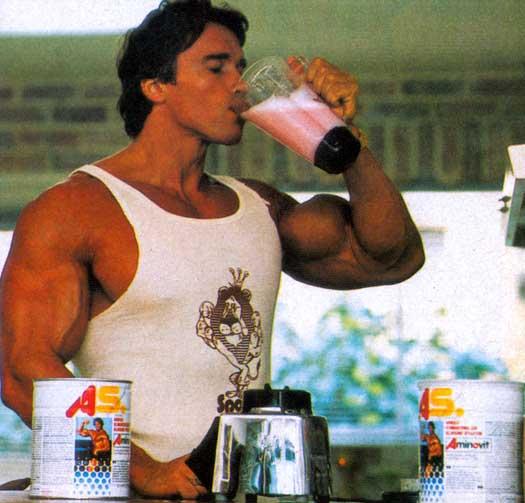
More Protein = More Muscle
Protein is great, but you shouldn’t start eating tubs of it daily. Your body can only process a certain amount of protein at one time. Experts recommend staying below 40 grams of protein in one meal as the remaining will likely be turned into waste. (5)
Protein Supplements
Although you don’t necessarily need protein supplements, and whole foods should be your first priority to meet your daily calorie needs, supplements can come in handy to fill in the void in your diet.
These days, you can find a ‘high-protein’ variant of almost anything from peanut butter to whole wheat bread. However, in my opinion, these two options can make your life so much more convenient:
- Powders: You can choose between whey or casein protein powders, depending on your needs and objectives.
- Protein Bars: I don’t recommend making them a part of your daily routine. Nonetheless, they come in handy when you are starving and don’t have access to healthy food.
Conclusion
The ideal daily protein intake usually ranges between 1.2 to 2.2 grams of protein per kilogram of body weight, depending on your current fitness levels and genetics and your training objectives (muscle gain or weight loss).
Whether you are an athlete, pushing your limits in each workout, or are a hobbyist lifter who is trying to improve and maintain your overall health, meeting your daily protein intake goals is indispensable for achieving your fitness objectives.
If you have questions about protein or your ideal intake, post them in the comments below, and I’ll be happy to help.
References:
- Moon J, Koh G. Clinical Evidence and Mechanisms of High-Protein Diet-Induced Weight Loss. J Obes Metab Syndr. 2020 Sep 30;29(3):166-173. doi: 10.7570/jomes20028. PMID: 32699189; PMCID: PMC7539343.
- Reid-McCann RJ, Brennan SF, McKinley MC, McEvoy CT. The effect of animal versus plant protein on muscle mass, muscle strength, physical performance, and sarcopenia in adults: protocol for a systematic review. Syst Rev. 2022 Apr 13;11(1):64. Doi: 10.1186/s13643-022-01951-2. PMID: 35418173; PMCID: PMC9006591.
- Stokes T, Hector AJ, Morton RW, McGlory C, Phillips SM. Recent Perspectives Regarding the Role of Dietary Protein for the Promotion of Muscle Hypertrophy with Resistance Exercise Training. Nutrients. 2018 Feb 7;10(2):180. doi: 10.3390/nu10020180. PMID: 29414855; PMCID: PMC5852756.
- Lak M, Bagheri R, Ghobadi H, Campbell B, Wong A, Shahrbaf A, Shariatzadeh M, Dutheil F. Timing matters? The effects of two different timing of high protein diets on body composition, muscular performance, and biochemical markers in resistance-trained males. Front Nutr. 2024 May 23;11:1397090. doi: 10.3389/fnut.2024.1397090. PMID: 38846541; PMCID: PMC11156191.
- Schoenfeld BJ, Aragon AA. How much protein can the body use in a single meal for muscle-building? Implications for daily protein distribution. J Int Soc Sports Nutr. 2018 Feb 27;15:10. Doi: 10.1186/s12970-018-0215-1. PMID: 29497353; PMCID: PMC5828430.
Tip: If you're signed in to Google, tap Follow.



